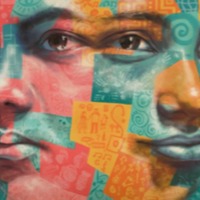
I was captured three years ago at the beginning of the dry season. I was caught in Marim. I had gone there to visit my aunt. When the Arabs came, I tried to run away. But I was surrounded. About eight men grabbed me. They all wore uniforms. They tied my hands to a long rope. Other people were tied to it too.
Then they took us to the train station at the bridge over the River Lol. This station is between Ariath and Wedweil. The soldiers put us in the cars of a train. There were about 28 people in my car. We had to stay inside the car for four days. They only let us out at night for a short time when they gave us food. After we were finished with our food, they put us back inside. It was very hot and dirty in there. The train was then on its way to the North from Wau. When it was ready to leave the station, we were taken out, and had to walk to the North. I was tied up, like before, for the walk.
On the way, I had to carry a sack of durrah, and was beaten by the soldiers. It took us eight days before we reached Daein. We were divided up there. The one who organized it was Mohammed Abdullah. He was the leader of the Popular Defense Force. He gave me to Jima Mahmoud. He was one of the soldiers who caught me. Jima Mahmoud took me to his home. He lives in Daein town.
Life was very hard with Jima and his wife Howah. They made me grind grain and look after their goats. Every night they tied my hands and legs together and put me in a small outhouse without windows. Jima had another slave. He called him Jima, but his real name is Garang Ngor Bol. He was also tied up and put in the outhouse. We were able to speak Dinka secretly to each other in the outhouse. One day, Garang disappeared. Howah told me was sent to Khartoum. In the evenings, they made me go to the koranic school. I had to memorize the Koran. Teacher Bakhiet would beat me with a whip if I could not memorize well.
The khalwa was only for slaves. There were 15 of us, 12 boys and three girls. All of us were teenagers. We were not allowed to speak to each other in Dinka. The teacher said we are now Mujahadeen and would be given guns and money, and would be sent to the South to fight against the Dinka who have no religion. He said the Dinka are not good people, and that he did not want them in the South anymore. I did not like the khalwa. I am a Christian. I used to go to church in Yargot. Sometimes Father Jervis would come and visit us. I was baptized and confirmed by him. I will go to church again when I get back home.
Narrative as told to Christian Solidarity International, January 1999, in Northern Bahr El Ghazal, Sudan.









